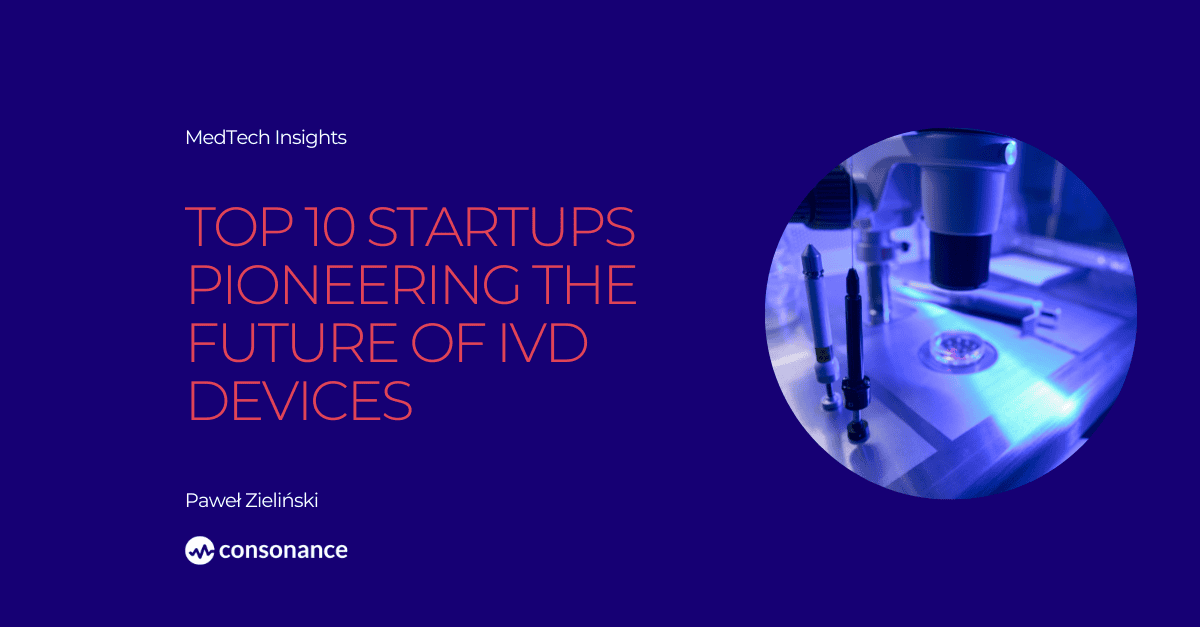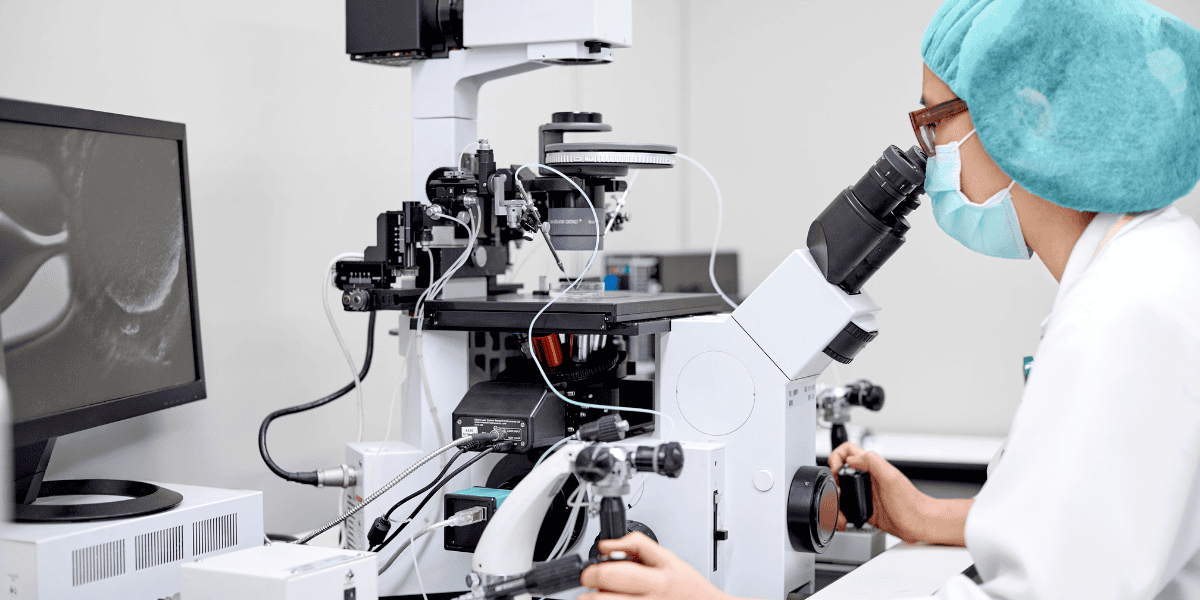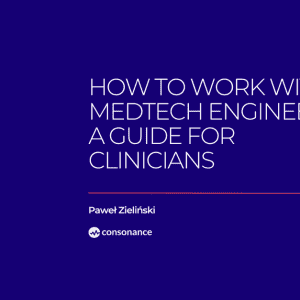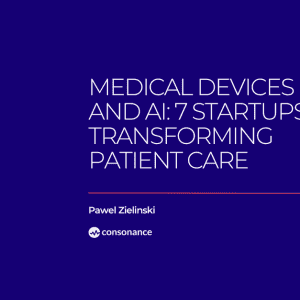Top 10 Startups Pioneering the Future of IVD Devices

IVD devices (In Vitro Diagnostic) encompass a wide range of tests and analyses performed on samples taken from a patient’s body, such as blood, saliva, urine, or tissue. Traditionally limited to laboratory settings, there is a growing trend to move diagnostics to point-of-care (POC) environments or even to patients’ homes, significantly reducing the time required to obtain results. The applications of IVD devices are extensive, covering diagnostics, health monitoring, and therapy effectiveness assessment.
This field of medicine is rapidly advancing, not only in terms of new diseases that can be diagnosed but also in the methods used. These range from simple tests, like blood analyses, to advanced genetic and molecular examinations. The benefits of IVD devices development include streamlining hospital operations, offering greater convenience for patients with chronic conditions, and easing the burden on laboratories. Below are 10 startups that have stood out with their hardware solutions, testing methods, or that enable less invasive ways to detect diseases:
If you want to shape the healthcare future with IVD devices, let’s talk!
This field of medicine is rapidly advancing, not only in terms of new diseases that can be diagnosed but also in the methods used. These range from simple tests, like blood analyses, to advanced genetic and molecular examinations. The benefits of IVD devices development include streamlining hospital operations, offering greater convenience for patients with chronic conditions, and easing the burden on laboratories. Below are 10 startups that have stood out with their hardware solutions, testing methods, or that enable less invasive ways to detect diseases:
Revolutionizing Healthcare with IVD Devices: Screening results
- GENOMTEC
Genomtec is a startup focused on developing molecular diagnostics technology. Their main product, Genomtec ID, is a portable, rapid, and precise diagnostic tool that can be used directly in point of care settings. It allows for quick identification of infections based on the analysis of biological samples, significantly reducing the wait time for results compared to traditional methods. - Momm Diagnostics
Momm Diagnostics uses microfluidics and specific biomarkers to develop tests for identifying complications during pregnancy. They focus on recognizing preeclampsia, a condition dangerous for both the mother and the baby. Given the importance of regular monitoring they are also developing technology that can be used both in clinics and at home. - QuantiLight
QuantiLight is working on a portable analyzer and test cassette based on drop of blood. The test relies on photodetection of biomarkers, where sensors emit light that changes color depending on the concentration of desired factors. This test is designed for quick execution, with the goal of making it home-usable, especially for chronically ill patients who need frequent testing to adjust medication dosages. - GeneSys Bio
GeneSys Bio concentrates on innovating rapid technology for monitoring and detecting pathogens. They use molecular diagnostics, particularly PCR (polymerase chain reaction), to detect infections, initially targeting urinary tract infections in the elderly and hospitalized patients. They aim to develop tools that increase the accuracy and availability of genetic analyses, making them more widespread. - GlyCardial
GlyCardial is engineering an IVD device for the early detection of cardiovascular diseases, specifically myocardial infarction. Their biomarker-based tests enable quick and precise detection of heart muscle ischemia, facilitating early intervention and improving patient outcomes. - Fluilux
Fluilux is focused on developing technology based on surface-enhanced Raman spectroscopy (SERS) integrated within centrifugal microfluidic cartridges. This combination aims to optimize antibiotic dosing for sepsis patients (therapeutic drug monitoring). The portable analyzer they are currently working on is designed to provide rapid and efficient analysis of antibiotic drug concentration within 30 minutes, significantly improving the treatment process and patient outcomes. - Nanobiose
Nanobiose develops devices in the field of nanobiotechnology for diagnostic solutions. Their main focus is on lab-on-chip technology, which combines several tasks typically performed in a laboratory onto a single chip. This solution aims to improve molecular research and development analysis, especially in evaluating the toxicity and efficacy of drugs on cells. - Flux Biosciences
Flux Biosciences focuses on inventing diagnostic IVD devices that can be used outside of laboratories. The test they work on utilize magnetoresistance technology to detect, among other things, fertility hormones in home settings. Additionally, these tests are portable and precise, with results that can be sent to physicians, making it easier to monitor patients’ health in various conditions. - Mimark
Mimark is a startup focused on developing an innovative method for detecting endometrial cancer, a disease affecting many women worldwide. Their non-invasive IVD test, called WomEC, utilizes a panel of five protein biomarkers found in uterine fluids. This solution helps avoid traditional, invasive methods, while simultaneously improving patient comfort and diagnostic accuracy. - Scailyte
Scailyte has built the ScaiVision platform, which uses artificial intelligence algorithms to identify biomarkers from single-cell data. They aim to enable precise diagnostics of cancers and autoimmune diseases, revolutionizing precision medicine. Their goal is to improve patient care by matching specific drugs to individual patients based on technology they develop.

Revolutionizing Healthcare with IVD Devices: A Look at Top Startups
Summary
Portable diagnostic devices, biomarker-based tests, and advanced artificial intelligence algorithms have tremendous potential to revolutionize the way we diagnose and monitor patient health. These innovations enable testing in previously hard-to-reach locations, such as healthcare points or even patient’s homes. As a result, diagnostics are becoming faster, more accessible, and more precise. The startups mentioned here are delivering more personalized and effective solutions, leading to better treatment alignment with individual needs, which ultimately improves patient outcomes and quality of life.If you want to shape the healthcare future with IVD devices, let’s talk!






